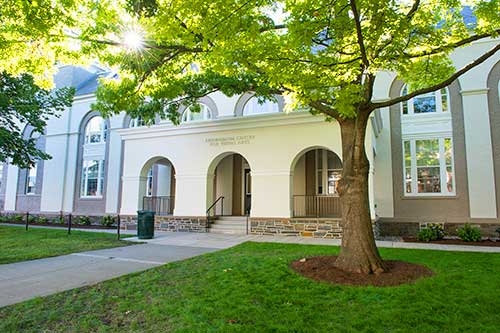September 23 - November 19, 2021 Monday - Friday 9AM-5PM
Crowell and West Galleries
Feigenbaum Center for Visual Arts
Four Artists /Four Voices, curated by sculptor and Union College professor Chris Duncan, showcases the work of four American and German artists linked by a shared interest in familiar content transformed through processes of making. Anne Carnein, Felicia Glidden, Richelle Soper, and Kristen Tordella-Williams know one another through Salem2Salem, a unique international residency program. Salem2Salem annually provides ten American and ten German artists – musicians, sculptors, painters, writers – an opportunity to live and work together for three weeks, alternating year to year at either Salem Art Works in Salem, New York or Schloss Salem in Germany’s Bodensee region. It’s an experience that leads to bold creative experiments as well as enduring friendships.
Anne Carnein (Germany) makes sculpture based on organic forms. Literally rooted, like plants these sculptures search out the light or push their way down into the earth. Close inspection of Carnein’s meticulously hand-built objects reveals a patchwork of fabric, color, and detailed stitching, creating surfaces and sculpted forms far more complex than they first appear. Her searching vision rejoices in the physicality of the objects while acknowledging their transience.
Felicia Glidden (US, Germany) creates work made of everyday stuff that we toss away – newspaper, film transparencies, plastic bags… this detritus becomes the base on which Glidden builds statements that are both elegant and disturbing. The personal and the political lie literally just beneath the picture plane, and sometimes as you’re settling in to the deep color and the comfortable grid of the composition, they swim to the surface and take a bite out of you.
Richelle Soper (US) wrings unexpected transformations from recognizable forms to create objects and installations at once familiar, comic, and unsettling. Elements are connected by mysterious tubes and wires; things that should be hard are flexible and vice versa; surfaces are startling. With an animated quality that recalls anthropomorphized appliances of 1930’s cartoons, we’re not sure if their faux functionality is benign or malevolent. They do have lives of their own.
Kristen Tordella-Williams (US) explores intersections between nature and culture, process and product. Burnt pages of a book are carefully preserved in small flags of handmade paper; a thing once whole now exists as fragments we can only partially decipher. In her cast iron wreaths, the organic and the manufactured are transitory yet permanent through conversion into metal. We’re left with a sense of the importance as well as the inevitability of transformation.
“For these artists, the work of the hand, the intensive process, and the use of materials found in daily life are fundamental. [They have] found their way to idiosyncratic materials and ways of making that perfectly embody their core concerns. Layers of labor are visible in the final works, reminding us of the histories and processes that they have embedded within them. And each asks us to imagine reframing our relationship to the natural and constructed world.” -- from the catalog essay by Rachel Seligman,
Malloy Curator at the Tang Teaching Museum and Art Gallery at Skidmore College.





